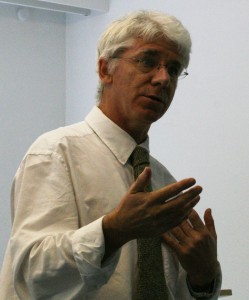On Wednesday, June 3, Professor Thomas Docherty opened a lecture on Karl Marx’s ideology by putting forward a provocative question: Are the days of Marxism really over? Or can we still expect a ‘revolution’? Although the question was not weighed down by a serious tone, the presentation and discussion explored the ways in which it remains pertinent.
In order to unfold Marx’s ideas and arguments, we turned to Hegel — or, more precisely, to his followers and his critics. Hegel offered perhaps the most influential philosophy of the working of the state, but both Old and Young Hegelians noted one central failing within it: his theory posits an ideal that the real state, in its everyday functioning, cannot live up to. From this problem derives one of Marx’s biggest concerns: what do we do with the discrepancy between the abstract concept of the state, expressed in words, and the experience of those who live within the framework it establishes? Marx describes the criticisms posed by the Young Hegelians as the mere juxtaposition of ‘phrases’ with ‘phrases’. There is a stark difference between things as they really are and the way we represent them (the saying of things). He asks why none of his contemporaries investigate the connection between German philosophy and German reality and thereby connect their criticism to their material context.
Marx seems to claim that the only possible way to bring the state closer to its ideal lies not in reformation, but in dissolution. A new set of material circumstances should be created, and from this world new ideas will arise. Man produces himself through labour, and presents a hinge between the past we have inherited and the future that follows. It is interesting that for Marx, changes in ideas come after the world has changed, and not vice versa, as one might think. God is a product of our consciousness, an alienation of something from within ourselves onto the outside world. Man is an event, an irruption, and has the power to act upon history and to change its course. “Event” is meant in the sense that each action does not have a predictable outcome; something is an event only when we do not know what the outcome was to have been. Marx’s view of historical possibility parallels his view of language. Rather than dwelling on its capacity for producing distortion and conflict, he emphasizes, like the Romantic poets, “the real language of men”, language as communication between human beings, as real, practical consciousness.
Thomas Docherty is Professor of English and Comparative Literature at the University of Warwick. His main fields of interest are the philosophy of literary criticism, critical theory and the cultural history in relation primarily to European philosophy and literature. Some of his books are Reading (Absent) Character; John Donne Undone; On Modern Authority; Postmodernism; After Theory; Alterities: Criticism and Modernity. His latest book is Aesthetic Democracy.
Article by Elena Volkanovska ('09, Macedonia)

